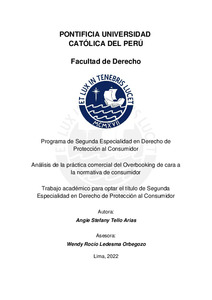| dc.contributor.advisor | Ledesma Orbegozo, Wendy Rocío | |
| dc.contributor.author | Tello Arias, Angie Stefany | |
| dc.date.accessioned | 2023-03-27T22:53:00Z | |
| dc.date.available | 2023-03-27T22:53:00Z | |
| dc.date.created | 2022 | |
| dc.date.issued | 2023-03-27 | |
| dc.identifier.uri | http://hdl.handle.net/20.500.12404/24553 | |
| dc.description.abstract | El deber de idoneidad alude a la correspondencia entre la expectativa que tiene
el consumidor con lo que en efecto recibe. De tal manera, en el sector de
transporte aéreo, los consumidores que adquieren un pasaje para transportarse
a un destino determinado en un horario concreto, lo hacen porque tienen un
interés previo de que el viaje se realice conforme lo contratado. Sin embargo,
existe una práctica comercial realizada por muchas aerolíneas llamada
overbooking o sobreventa de pasajes, la cual consiste en aceptar una cantidad
de reservas superior al número de asientos de un vuelo. Si bien, existen diversas
posiciones respecto a si se debería permitir el overbooking, la realidad es que en
el ordenamiento jurídico peruano esta práctica comercial no se encuentra
prohibida, sino solo determina los remedios legales que las aerolíneas tienen que
desplegar para compensar al consumidor afectado. Siendo esto así, en el
presente artículo se realizará un análisis respecto a si la práctica comercial del
overbooking vulneraría la idoneidad que debe cumplir todo producto o servicio
contratado. Asimismo, se plantean una serie de recomendaciones con el objetivo
de poder otorgar una mejor protección a los derechos que tiene todo consumidor
en el sector de transporte aéreo. | es_ES |
| dc.description.abstract | The duty of suitability refers to the correspondence between the expectations that
the consumer has with what he actually receives. In this way, in the air transport
sector, consumers who purchase a ticket to travel to a specific destination at a
specific time, do so because they have a prior interest that the trip be carried out
as contracted. However, there is a commercial practice carried out by many
airlines called overbooking or overselling tickets, which consists of accepting a
number of reservations greater than the number of seats on a flight. Although
there are different positions regarding whether overbooking should be allowed,
the reality is that in the Peruvian legal system this commercial practice is not
prohibited, but only determines the legal remedies that airlines have to deploy to
compensate the affected consumer. This being the case, in this article an analysis
will be carried out regarding whether the commercial practice of overbooking
would violate the suitability that any contracted product or service must comply
with. Likewise, a series of recommendations are proposed with the aim of being
able to grant better protection to the rights of every consumer in the air transport
sector. | es_ES |
| dc.language.iso | spa | es_ES |
| dc.publisher | Pontificia Universidad Católica del Perú | es_ES |
| dc.rights | info:eu-repo/semantics/closedAccess | es_ES |
| dc.subject | Aeronáutica comercial--Perú | es_ES |
| dc.subject | Protección del consumidor--Legislación--Perú | es_ES |
| dc.subject | Transporte áereo--Perú--Regulación | es_ES |
| dc.title | Análisis de la práctica comercial del Overbooking de cara a la normativa de consumidor | es_ES |
| dc.type | info:eu-repo/semantics/bachelorThesis | es_ES |
| thesis.degree.name | Segunda Especialidad en Derecho de Protección al Consumidor | es_ES |
| thesis.degree.level | Título Profesional | es_ES |
| thesis.degree.grantor | Pontificia Universidad Católica del Perú. Facultad de Derecho | es_ES |
| thesis.degree.discipline | Derecho de Protección al Consumidor | es_ES |
| renati.advisor.dni | 10803344 | |
| renati.advisor.orcid | https://orcid.org/0000-0002-5290-8868 | es_ES |
| renati.author.dni | 72606256 | |
| renati.discipline | 421059 | es_ES |
| renati.level | https://purl.org/pe-repo/renati/level#tituloSegundaEspecialidad | es_ES |
| renati.type | https://purl.org/pe-repo/renati/type#trabajoAcademico | es_ES |
| dc.publisher.country | PE | es_ES |
| dc.subject.ocde | https://purl.org/pe-repo/ocde/ford#5.05.01 | es_ES |






